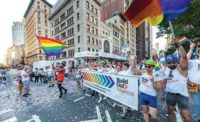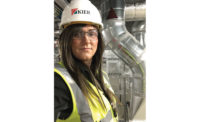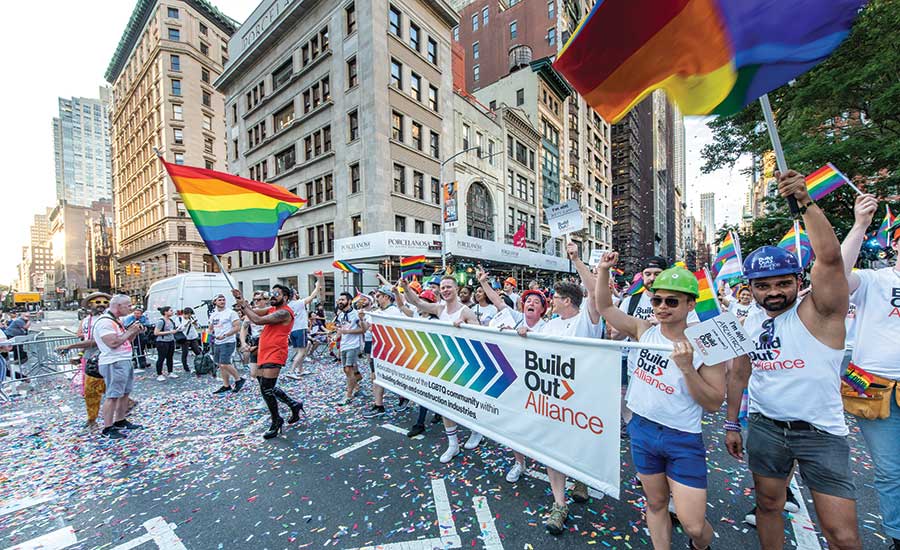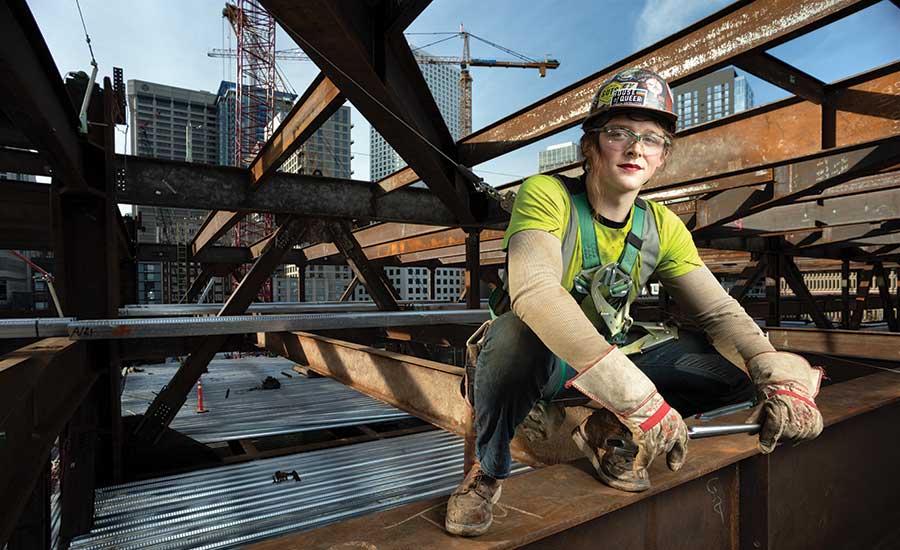Workplace Diversity
After Years of Antipathy, Construction Puts Out Welcome Mat For LGBTQ Workers
Protections against discrimination remain incomplete from state to state

Hundreds of engineers, architects, contractors and other construction employees marched with industry LGBTQ+ groups Build Out Alliance and Qu-AKE during the World Pride march in New York City in June 2019.
PHOTO COURTESY OF BUILD OUT ALLIANCE

As a foreman, Turner’s Greene ensures workers are treated with respect.
PHOTO COURTESY TURNER CONSTRUCTION

Riley conducts a toolbox talk about LGBTQ+ issues and safety for workers at the Crossrail project in London.
PHOTO COURTESY CHRISTINA RILEY

Richter’s company Heels and Hardhats became the first trans woman-owned business to be certified as a DBE and WBE in Illinois.
PHOTO COURTESY JACKI RICHTER

WSP’s Díaz-Fañas visits a jobsite.
PHOTO COURTESY GUILLERMO DÍAZ-FAÑAS

Chevron chairman and CEO Michael K. Wirth speaks at the company’s Pride Flag-raising event in June.
PHOTO COURTESY CHEVRON

Ellis says she shares lessons learned from the jobsite with people from other marginalized groups who are just starting out as apprentices in the ironworkers union.
PHOTO BY RICK DAHMS

Gilbane’s Tesoriero (right) wears a hardhat with a rainbow flag sticker on site at the YMCA Aquatic Center project in the Bronx.
Credit: Photo courtesy Gilbane Building Co.

A rainbow-painted backhoe carries the banner at London Pride for Building Equality, a U.K.-wide LGBTQ group sponsored by numerous construction industry companies.
Credit: Photo courtesy Christina Riley

Arup’s Tavolaro was project manager and lead structural designer for Torra Reforma, the tallest skyscraper in Mexico City
Credit: photo courtesy Arup










For years, construction workers have faced the risk of being ostracized, bullied or fired over their sexual orientation or gender identity. After a lengthy job search in 2008, Jackie Richter, who was transitioning from male to female at the time, says a concrete contractor who wanted to hire her said, “You’ve got the experience, you’ve got the knowledge, and you’d be a great part of our team … but leave your girl clothes home and come as a man.”
The same year, a successful architect, who wishes to remain anonymous due to fear of reprisals, said he was fired when the owners of his company monitored his texts and found out he was gay.
More recently, Guillermo Díaz-Fañas experienced microaggressions at a previous employer due to his perceived mannerisms, even though he wasn’t out as a gay man at the time. Things escalated to the point where unfounded rumors spread among his colleagues that he had AIDS, based solely on the suspicion of his sexual orientation. When he raised concerns to one of his supervisors, nothing happened. “That’s when I understood that it was the leaders who had the problem with me,” he says.
“The construction industry is still fraught with lots of folks who do not accept other people. But if we are the leaders and the catalysts, and we use active caring in the process, eventually cultures change.”
– Peter J. Davoren, Turner Construction CEO
Today, all three have overcome these negative experiences and work to show how inclusivity benefits the industry. Richter owns two successful construction companies in the Chicago area. The architect started his own practice and Díaz-Fañas founded Queer Advocacy and Knowledge Exchange (Qu-AKE), one of the first construction industry groups in the U.S. for lesbian, gay, bisexual, transgender and queer (LGBTQ+) workers. He also moved to a more inclusive workplace, at WSP, where he thrives as an award-winning senior technical principal.
Despite advances, LGBTQ+ employees can still be legally fired or discriminated against in 29 states. At the federal level, the Equality Act, passed by the House of Representatives earlier this year to add LGBTQ+ protections to existing civil rights laws, faces an uphill battle in the Senate.
As a result of this inactivity, a growing number of firms are taking action to stamp out workplace discrimination and prevent the loss of valuable talent by strengthening their diversity and inclusiveness policies, actively recruiting and retaining LGBTQ+ employees and speaking out to educate others in the industry.
 |
| Jackie Richter, who now owns two successful construction companies in the Chicago area, was once told by an employer to "leave your girl clothes at home." |
“It is our responsibility to have diversity in mind when hiring, promoting and advancing the careers of all people at Turner, and this extends to our LGBTQ+ colleagues,” says Peter J. Davoren, the firm’s president and CEO. “Turner’s commitment to diversity and inclusion has brought many advantages and an increase in long-term success for our people and the company. The most significant impacts have been on the culture of our organization and connectivity among our people.”
For the past four years, Turner has received a perfect score on the Human Rights Campaign’s (HRC) Corporate Equity Index, which rates companies on their nondiscrimination policies, equitable benefits, support for an inclusive culture and corporate social responsibility.
This year, Black & Veatch, Overland Park, Kan., also achieved a perfect score. “It’s really the right thing to do to treat people equally and recognize that we all have different perspectives,” says Steve Edwards, CEO. “We need to appreciate those differences and find ways to draw strengths from that rather than find ways to pull [people] apart.”
While the firm has had an internal LGBTQ+ employee resource group for several years, this year Black & Veatch took additional steps to bolster inclusivity, such as strengthening equality in health care benefits and pledging to include LGBT-owned businesses in its supplier network. “Diversity and inclusion lead to better results,” Edwards says. “Strong collaboration where people recognize different perspectives that are being shared openly and transparently among everyone always leads to better decisions and outcomes.”
Signing The Pledge
Edwards, along with the CEOs of dozens of construction firms including Mortenson, JE Dunn, Autodesk, Performance Contracting Co. and Burns and McDonnell, have signed the CEO Action for Diversity & Inclusion pledge. The 800+ signatories focus on cultivating workplaces that support open dialogue for difficult conversations about diversity and inclusion, creating a hub for companies to share best practices, implementing unconscious bias training and sharing strategic D&I plans with their boards.
In its 2018 report Delivering Through Diversity, McKinsey & Co. showed that companies in the top quartile for ethnic/cultural diversity (including LGBTQ+) on executive teams were 33% more likely to have industry-leading profitability, indicating that inclusivity “of highly diverse individuals can be a key differentiator among companies,” the report says.
Lee Jourdan, Chevron’s Chief Diversity Officer, says that recruiting from the LGBTQ+ community is “not just the right thing to do, but the smart thing to do, and creates a competitive advantage for us” over less inclusive companies. “That’s a pool of talent that [others] are not getting that we are,” he adds. Plus, employees at more inclusive firms “see they’re able to bring their authentic selves to work because other people are doing that, and that’s how you’re going to get the most out of everybody. It has an add-on multiplier effect that companies are not going to be able to get if they don’t open their aperture to everyone out there.”
Chevron’s Pride Network, formed more than two decades ago, now has 1,600 members in 15 chapters on six continents and serves as the cornerstone for a dozen other diverse employee networks incorporating nearly half of the company’s 45,000 employees.
|
Related Article |
Yet determining how many employees are part of the LGBTQ community can be difficult. In a 2018 HRC survey of 804 LGBTQ workers and 811 straight respondents across all industries, 46% of LGBTQ workers remain closeted at work, and half of the non-LGBTQ workers reported that there were no “out” employees at their firm. Further, the findings report that 59% of non-LGBTQ workers think that it is unprofessional to talk about sexual orientation and gender identity in the workplace.
“The construction industry still is fraught with lots of folks that do not accept other people,” says Davoren. “But if we are the leaders and catalysts, and we use active caring in the process, eventually cultures change. We are seeing impacts of those changes by the employees that we hire and the employees that are working with us who say we’re heading in the right direction.”
Prospective employees take notice of these values, factoring a company’s inclusiveness as a deciding factor when entering the job market. While finishing his masters degree, John-James (JJ) Tesoriero interned at a construction company where he wasn’t comfortable being openly gay. As a result, “I felt my performance and team dynamic suffered,” he says. “When I received a job offer from Gilbane in 2018, I made a point to ask about their efforts to promote LGBTQ+ inclusion.” The firm had just started an LGBTQ+ employee resource group, and it encouraged Tesoriero to help facilitate the ERG’s growth.
Today, project engineer Tesoriero not only chairs the company’s New York City Pride ERG, but also “proudly displays a picture of my boyfriend on my desk and wears a rainbow hard hat sticker on construction sites.” He’s also taken on an additional role as a sustainability council representative. “I am experiencing firsthand how a company’s thoughtful policies can contribute to individuals realizing their full potential,” he says.
Research in the 2018 HRC study shows that of LGBTQ+ employees working in an unwelcoming environment, 31% were unhappy or depressed at work, 25% felt distracted from work and 20% of study participants looked for another job.
“Happy and contented employees are more engaged and more productive,” says Peter Gracey, an engineer with Bechtel and co-founder of the firm’s new BProud business resource group. “If you’re going to expend energy in hiding parts of yourself, that’s useful energy that could be devoted to other things.”
In addition, diverse teams tend to be more productive and benefit from people with different backgrounds and viewpoints, he says. “If you want to encourage people from different backgrounds to come into your organization, you need to be able to demonstrate that you’ve got that welcoming, inclusive environment. Otherwise you’re not going to recruit from all areas of society.”
Worst Kind of Conversation
Despite changing attitudes in the front office, LGBTQ+ workers at construction jobsites still face significant challenges. Mykka Ellis, who joined the Ironworkers Union as a trans woman in 2016, says she got a lot of support when they would send her out to jobsites. “My union was very firm on my gender, who I was and how I was to be treated,” she says. Once on site though, some of the other tradeworkers were shocked to see a trans woman ironworker. “Trans women are perceived and pressured to be hyper feminine, and I am working in a hyper masculine trade,” Ellis says. While many of the questions and comments could be chalked up to curiosity, she says “the worst kind of conversation I’ve had would be people just straight up coming up to me and asking me, ‘What do you have down there?’ ”
When Mercedes Greene first entered the trades in New York City more than a decade ago, she first experienced being treated differently as a woman. Then, when male workers learned she was a lesbian, a few would refuse to work with her. “You have to remember what construction was and where it is now. There’s a big difference. But you have a lot of old-school guys who still run work, and they don’t understand the theory of [inclusiveness].” She’s now a project laborer foreman running an inclusive crew with Turner, which she says “leads the industry” in acceptance of women and LGBTQ+ individuals.
“Not just the right thing to do, but the smart thing to do, and creates a competitive advantage for us.”
– Lee Jourdan, chief diversity officer, Chevron
Both Ellis and Greene have since proven themselves as hard workers who excel at their jobs. But in an effort to make entering the trades less traumatic for future prospects, industry groups have initiated programs to make worksites more inclusive. For example, the Ironworkers Union’s Be That One Guy training program encourages all workers to speak out if they observe any type of bullying, harassment or homophobia. If a worker’s “head isn’t in the game” due to harassment, “that can have deadly consequences” to jobsite safety, says Vicki L. O’Leary, the union’s general organizer for diversity.
Ellis, who had been fired from several jobs for being a trans woman and was living in “trans-poverty” prior to joining the union, says “having someone who advocates for you at work completely turned that around.”
Early next year, the Associated General Contractors of America will launch Culture of Care, a new program focusing on creating inclusive project sites to bring new individuals into the industry. “It was initially started by our AGC of Washington chapter, and we are expanding it into a national campaign, aimed at helping companies ensure that their jobsites and workplaces are safe, welcoming, inclusive places that are free of harassment, hazing and bullying,” says Brynn Huneke, AGC director of diversity & inclusion.
Structural engineer Tabitha E. Tavolaro, a principal with Arup, says her transition to female, which began almost 10 years ago, actually made her “much more comfortable on a construction site. Being able to be myself and be authentic, I’m able to be much more in control of the situation and have the confidence and authority to excel as a representative of my firm and as an industry leader,” she says.
Recognizing the need to establish guidelines to assist other employees throughout the company who may be transitioning themselves, or work with someone who is transitioning, Arup’s LGBTQ+ ERG leader, Jesse Vernon, in collaboration with the firm’s HR team, took Tavolaro’s pioneering experience and used it as a springboard to develop a company-wide transition toolkit to offer guidance and educational content. Arup released the packet to all employees earlier this year.
Prior to joining Arup, Leo Hegde, now a graduate consultant in acoustics for the firm, attended an Out for Undergrad Engineering event, where dozens of firms, including Arup, regularly recruit LGBTQ+ talent. “It was a huge priority for me at that time navigating the job search to find companies that were inclusive of trans and gender diverse folks,” Hegde says. Knowing that Arup had tangible gender transition documentation and upheld an inclusive workplace was a huge attraction in accepting the job offer, he adds.
Visible Role Models
While many individual firms provide in-house networking groups for LGBTQ+ workers, there are few industry groups in the U.S., and none are nationwide. Qu-AKE, based in New York City, ensures that LGBTQ+ role models are visible to people just starting out in their careers, which helps motivate and inspire the younger generation to stay in the industry, Díaz-Fañas says.
Another New York City-based group, Build Out Alliance, incorporated as a 501(c)(3) last year and has garnered support from more than two dozen industry firms, including FXCollaborative, Turner, Gensler and Arup. The group “provides support and other valuable resources for employees that might not have it otherwise,” says board member Jake Andrew, a structural engineer at Thornton Tomasetti. “For example, we have members in our organization that are struggling to come out to their family or friends or figure out how they want to be out in the workplace. We also have some allies who are parents of LGBTQ+ professionals.” Recently, American Institute of Architects’ Chicago branch started the LGBTQI+ Alliance group, a first for AIA. All three groups hope to expand to more cities in the coming years.
In the U.K., there are several national groups and forums, including Building Equality and @LGBTConstruct, the latter founded by Christina Riley, who transitioned to female while working at Balfour Beatty. She is now a senior construction planner for Kier Group. “The LGBT community is one of the few areas of the industry where there’s a really strong collaboration between competitors to be inclusive as an industry,” Riley says.
However, Riley noticed there weren’t very many site workers attending the LGBT meetings. “So I decided, well, why don’t we go to them? And that’s where I started doing LGBT toolbox talks,” she says, including one at the Crossrail project to 200 site workers, discussing topics from safety to LGBT issues to anti-bullying. The toolbox talks led to workshops sponsored by the U.K.-government-funded Construction Industry Training Board and many other speaking engagements for Riley.
But working in other international markets can pose challenges for LGBTQ+ employees. According to the International Lesbian, Gay, Bisexual, Trans and Intersex Association (ILGA) State-Sponsored Homophobia report, there are 68 countries that explicitly criminalize consensual LGBT activity, including 11 where it is punishable by death.
"it's shocking to think that today, roughly a third of the world is specifically oppressive towards the LGBTQ community," Tavolaro says. "Arup firmly believes it's one of our aims to operate a humane organization. In that context, every staff member has the right to decline work on any project that they have an ethical issue with or any concern about their safety or right to self advocate."
Tavolaro faced this dilemna herself when offered to take on the role as project manager on a large infrastructure project in a country that has "very onerous, laws related to LGBTQ people," she says. "The discussions were very direct and frank and I explained that I'd be willing to lead the project up to the extent that I would not travel to the country where the project was being executed." The strategy worked since other major firms participating in the project were located in countries with less restrictive laws. "But it's disappointing that up until a point in time where those laws are removed, I will not travel to the country and I may never see the actual built project," she adds.
However, setting blanket policies where LGBT employees avoid those countries entirely can be counter-productive, says Tim Milam, managing director and partner with FXCollaborative. "From a global perspective, you don't want to limit something where you could actually have some impact to the project or client, or to educate or change things" in that society, he adds.
In the Philippines, where same-sex acts aren't criminalized but "LGBTQ members are often seen as social deviants," Chevron's Jourdan says the company "leaned forward and talked about treating everyone fairly" to become the first oil and gas industry firm to successfully petition the government to allow same-sex partner benefits and gender-neutral bathrooms for Chevron's Manila operations. "What it really boils down to is we believe in our vision and we believe in our values. There are certain laws and things that we have to abide by in certain countries, but we continue to try to push and make a home for folks in the LGBTQ community," he adds.
Supplier Diversity Network
After struggling to get a job, suffering depression and sinking into poverty that studies say impacts almost 30% of transgender people, Jackie Richter in 2010 co-founded Heels and Hardhats, a specialty contracting company in Illinois, with the help of mentoring and support from several key allies and early clients. Richter became an early pioneer as a trans woman-owned disadvantaged business enterprise. “We set precedents in the Illinois Dept. of Transportation and U.S. DOT,” she says. The certification process took two years, culminating in her meeting with a group from the state to “educate them on transgender and assure them I wasn’t just a man in a dress.” With the help of certification, the company has since become the largest LGBT-owned utility contractor in the U.S., and Richter this year founded a second company, Endurance, serving electrical utilities.
Firms such as Endurance can now become certified through the National LGBT Chamber of Commerce (NGLCC). In 2015, The California Public Utilities Commission added LGBT-owned firms to its supplier diversity program, which includes women-, minority- and disabled veteran-owned businesses. In 2018, CPUC reported that 0.11% ($38.8 million) of contracting work from utilities working in California went to LGBT-certified firms through the program. And the CPUC is not alone. The NGLCC has over 250 corporate partners that have expanded their supplier diversity programs to include LGBT-owned businesses, including Chevron and Turner.
According to the HRC, 572 U.S. businesses and 182 municipalities require their contractors to have LGBTQ-inclusive employment nondiscrimination policies. "We're getting more requests for proposals where diversity is talked about," Milam says, and FXCollaborative has ended up on at least one list of leads to design a potential project based on their diversity and inclusion work. "Clients are feeling that pressure too, to be diverse and inclusive, and they want to work with people that feel the same way."
Jordy Construction, a Denver-based commercial builder that went through NGLCC’s rigorous certification process, has attended the group’s leadership conferences every year, where prospective customers and contractors meet in a “speed dating” style program. From one of these 15-minute meetings, Jordy began an ongoing dialogue with Verizon, which has since turned into one of its largest customers, says Charles Jordy, CEO. And, last month, JPMorgan Chase awarded Jordy a contract to build a Denver bank as a direct result of being LGBT-certified, Jordy says. Both Verizon and JPMorgan Chase are also members of the Billion Dollar Roundtable, an advocacy group comprised of firms that spend at least $1 billion annually on minority or women-owned suppliers, including LGBT firms.
In a 2016 study, NGLCC estimated that LGBT-owned businesses contributed $1.7 trillion to the U.S. economy annually and created 33,000 jobs. Richter is one of many of those firms that seeks to hire disadvantaged people and support other diverse businesses.
“Our lives changed immensely because the people that helped us are the people that had faith in us to carry this message of compassion forward,” Richter says. “The LGBTQ+ community was oppressed for so long. Now, there are people excited to go to work, excited for that simple chance.”














